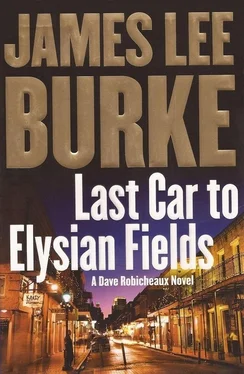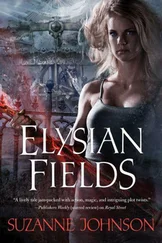“Is Father Dolan part of this?”
“He took me out to the Crudup place in St. James Parish.”
“This guy is playing you, Dave. He knows you don’t like authority or rich people and you’re a real sucker for a sob story. How about letting Dolan and the Throw-ups or whatever clean up their own shit?”
“ I’m getting played? You just gave a pornographic actor your apartment.
The same guy you hit in the head with a coffeepot. You go from one train wreck to the next.”
“That’s why I never listen to my own advice.”
He drank from his bottle of Dixie beer, his green eyes filled with an innocent self-satisfaction, his jaw packed with steak.
The next morning I drove to the house of Josh Comeaux, the clerk who I believed had sold daiquiris to Lori Parks and her friends the afternoon they burned to death. He lived with his mother in a small, weathered frame house not far from the Southern Pacific railway tracks. In the front yard was a post with hooks on it, from which vinyl bags of garbage hung so they would not be torn apart by dogs before the trash pickup.
Josh pushed open the screen door and stepped out on the gallery. He was barefoot and wore recycled jeans without a belt and a black T-shirt with the sleeves cut off. A heart with a circle of thorns twisted around it was tattooed high up on his right arm. Through the screen I could see a fat woman in a print dress watching a television program.
“You come to arrest me?” he said.
“Not yet. Who bruised up your face?”
He touched the yellow-and-purple discoloration below one eye.
“Dr. Parks did. Last night. After I got off from work.”
“Lori’s father?” I said.
“Yes, sir. That’s why I figured you were here.”
“He knocked you around?”
“I went in for gas at the all-night station. He walked me out in the shadows and hit me. He was pretty mad.”
“Are you telling me you confessed something to Dr. Parks?”
“Yeah. I mean yes, sir. I told him what I did.”
“Before you go any farther, I need to advise you of certain rights you have, the most important of which is your right to have an attorney.”
“Who is that?” the fat woman in the chair yelled through the screen.
“Just a guy, Mom,” Josh said, and walked out into the yard, out of earshot from his mother. “I told Dr. Parks I sold daiquiris to Lori and her friends. They were there three times that afternoon. It’s not the only time I’ve sold to underage kids, either. Mr. Hebert tells us not to hold up the line ‘cause somebody can’t find their driver’s license. But what he means is on weekend nights don’t pass up any business.”
“Mr. Hebert is your employer?”
“Yes, sir. At least till this morning. He fired me when I told him I’d served Lori and the other girls.”
“Did Lori give you an ID of any kind?”
He shook his head. “When Lori Parks wanted something, you gave it to her. She was the prettiest girl in Loreauville.”
“Josh, I’m placing you under arrest. Turn around while I hook you up.”
“Am I going to prison?”
“That’s up to other people, partner,” I said, and put him in the backseat of the cruiser, my hand on top of his head.
As we drove away I saw his mother walk out on the gallery and look in both directions, wondering where her son had gone.
That afternoon I called Lori Parks’s father at his office. His receptionist told me he was not expected in that day.
“Is the funeral today?” I asked.
“It was yesterday,” she replied.
“Would you give me his home number, please?”
“I’m not supposed to do that.”
“We can send a cruiser out there and bring him in, if you like,” I said.
When I called his home no one answered and the message machine, if he had one, was turned off. I checked out a cruiser and drove to Loreauville, nine miles up the Teche, and found his house in a wooded, hilly area on the bayou, just outside of town.
The one-story house was long and flat and constructed of what is called South Carolina brick, torn down from nineteenth-century buildings and shipped to Louisiana for use in custom-built homes. Apple green wood shutters that were ornamental rather than operational were affixed to the walls on each side of the windows and looked as if they had been painted on the brick. The porch ran the width of the house and was intersected with a series of miniature fluted columns. With its flat roof and squeezed windows, the house looked like a constipated man crouched back in the trees. It had probably cost a half million dollars to build.
Dr. Parks stood on a shady knoll overlooking the bayou, slashing golf balls across the water into a grove of persimmon trees. When I walked up behind him, leaves crackling under the soles of my shoes, he glanced at me for only a moment, then whacked another ball into the persimmons.
“I arrested Josh Comeaux this morning,” I said.
“Glad to hear it,” he said. His face was heated, freshly shaved, even though it was late in the day. He picked another ball out of a bucket and set it on a tee.
“He says you knocked him around.”
“What’s your business here, Detective?” He rested his driver by his foot. He wore doeskin gloves that had no fingers and a long-sleeve maroon polo shirt and casual slacks that accentuated the flatness of his stomach and the graceful line of his hips.
“I’d like to see the owners of these drive-by daiquiri stores run through a tree shredder. But you’re taking out your anger on the wrong person, Dr. Parks,” I said.
“I moved my family here from Memphis. We thought small-town America wouldn’t have drugs and political officials on the take and bastards who sell children booze to kill themselves with. I’ve been a stupid man.”
He took his position on the tee, lifted his golf club with perfect form, and whipped it viciously into the ball.
“Don’t add to your grief, sir,” I said.
He turned and faced me. “You have any idea of what it might have been like inside that car?” he said.
“The tox screen showed traces of marijuana in Lori’s blood,” I said.
“So what?”
“Maybe Josh Comeaux is a victim, too.”
“I must have done something wrong in a former life,” he said.
“Pardon?”
“My daughter was burned alive and the cop who should be kicking somebody’s ass is a goddamn titty-sucking liberal. You need to leave my property.”
I took my sunglasses out of their case, then replaced them and stuck the case back in my shirt pocket. The wind was cold blowing out of the trees and I could smell the heavy odor of the bayou in the shadows. The skin under Dr. Parks’s right eye seemed to twitch uncontrollably.
“Are you hard of hearing?” he asked.
“The judge will probably go light on Josh’s bond. That means he’ll probably be back home in a day or so. Axe we clear on the implication, sir?” I said.
“That I’d better not hurt him?”
He waited for an answer but I didn’t give him one. I fitted on my sunglasses and walked back to the cruiser, my shoes crunching through the leaves the doctor had raked into piles, only to see them blown apart by the wind. The doctor’s wife emerged from the front door, wearing a house robe and slippers, a drink in her hand, the makeup on her face like a theatrical mask.
“You think I care about that boy? You think that’s what this is about? Where are your brains, man?” the doctor shouted after me.
The following evening I ate supper in the backyard, then went to the old cemetery by the drawbridge in St. Martinville where Bootsie was buried. The air was cold and smelled of distant rain, the sky yellow with dust blown from the fields. Several of the houses bordering the cemetery had signs on the galleries announcing TOMB PAINT FOR SALE. In south Louisiana we bury the dead on top of the ground and it’s a tradition to whitewash the crypts of family members on All Saints Day.
Читать дальше












